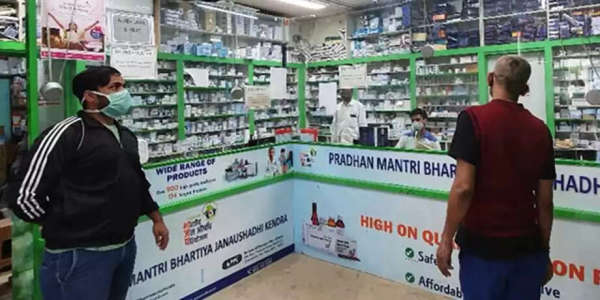
The central government has abolished the minimum distance condition related to opening Jan Aushadhi Kendra in metro cities and million-plus cities with a population of more than 10 lakhs. That is, now this decision has come into effect from September 10 in every street and locality in big cities. Its objective is to increase the reach of affordable generic medicines and to establish 25,000 Jan Aushadhi Kendras by 31 March 2027 under the Pradhan Mantri Bhartiya Jan Aushadhi Yojana (PMBJP).
Now, new Jan Aushadhi Kendras will be able to open close to each other in seven metros like Delhi, Mumbai, Kolkata, Chennai, Bengaluru, Hyderabad, and Ahmedabad. The distance condition has also been removed in 46 other big cities. This will make the availability of medicines easier, and entrepreneurs will also get a new opportunity.
How important is this scheme?
The objective of the Pradhan Mantri Jan Aushadhi Yojana is to make affordable generic medicines available to the general public. The medicines that are available in the market for 100-200 rupees are available at Jan Aushadhi Kendra for 20-50 rupees. The government claims that the medicines available here are 50% to 90% cheaper than branded medicines.
This change will end the problem of drug deserts, especially in urban areas, health expenses will reduce, and employment will also increase with the opening of new centers. Currently, around 17,000 Jan Aushadhi centers are running across the country, where 2,047 types of medicines and 300 surgical items are available.
Common people also save a lot.
According to the IANS report, store operator Ibrar Ahmed says that earlier, people used to get disappointed after seeing expensive medicines; now, they go away satisfied after getting cheap medicines. Customer Harendra Singh in Isuapar of Chhapra district says - Earlier the medicine used to cost 500 rupees, now the same is available for just 80 rupees. Similarly, patient Didar Waris says- A medicine costing Rs 200 in the market is available at Jan Aushadhi Kendra for Rs 50. Jan Aushadhi Kendras are not only providing cheap treatment to the general public, but are also providing a huge opportunity for employment and entrepreneurship.
Conditions for opening a Jan Aushadhi Kendra
1. Qualification- A Pharmacist should have a D Pharma or B Pharma certificate.
2. Space- At least 120 square feet of space is required.
3. Category-
Doctor, pharmacist, and registered medical practitioner
Trust, NGO, and private hospital
Person/institution nominated by the state government
4. Application fee – Rs 5,000
Help from the government.
15% incentive on sales of up to Rs 5 lakh every month or assistance up to a maximum of Rs 15,000.
One-time assistance of Rs 2 lakh to special categories.
Rs 1.5 lakh for furniture and Rs 50,000 for a computer-printer.
Up to 20% commission on the sale of medicines.
Application Process: Step-by-Step Guide
1. First of all, go to janaushadhi.gov.in.
2. Click on the 'Apply for Kendra' option on the homepage.
3. A new page will open. If you are registered, log in; otherwise, click on Register Now.
4. Create a new account by entering your name, mobile number, email ID, and password.
5. On completion of registration, the user ID and password will be sent to the email.
6. After logging in, fill out the application form.
Step 1: Application Form
Step 2: Download Letter of Principal Approval
Step 3: Drug License Submission
Step 4: Store Code Generation
7. Fill in the basic details and address of the proposed center. Upload the required documents (PDF, smaller than 5MB).
8. Tag the shop address by dragging and dropping it on the location map.
9. Submit the application fee of Rs 5,000 through online payment gateway.
10. Once the application is submitted, you will receive a confirmation via your email.
Application status can be checked by logging into the portal at any time or you can contact the helpline 1800 180 8080.
How much is the income?
People running Jan Aushadhi Kendra get help from the government to buy furniture and computers for the initial setup. Both commission and government incentives are received on the sale of medicines. For example, if medicines worth Rs 5 lakh are sold in a month, then an incentive of up to Rs 15,000 is received. An average commission of 20% is received on medicines. That is, this business is not only like a service but is also a profitable business model.
Disclaimer: This content has been sourced and edited from Dainik Jagran. While we have made modifications for clarity and presentation, the original content belongs to its respective authors and website. We do not claim ownership of the content.